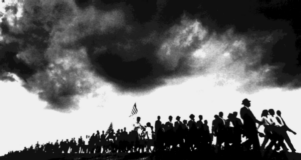History on public TV: returns from the pastThis Briefing page gives you access to pertinent stories from back issues of Current.
With such groundbreaking historical documentaries as Eyes on the Prize and The Civil War and the ongoing series The American Experience, PBS has a strong claim on its touted role, ''America's storyteller.''
The consistent center of public TV's historical offerings is The American Experience, but despite the acclaim it has received, the series struggles financially from season to season. Establishing a stable funding base was the first priority for the series executive producer, Margaret Drain. When Drain's predecessor, Judy Crichton, retired at the end of 1996, she talked with Current about the growth of a corps of accomplished history producers and the craft of historical documentaries. Pulitzer Prize-winning historian David McCullough, host of the series, said in a 10th anniversary speech that producers for the series typically add valuable substantive research to historical knowledge.
The most prominent of public TV's historical documentarians, Ken Burns, books up his time for years in advance to prepare history documentaries, and has adapted grand stories to the small screen so successfully that he started a land rush for the great topics. His brother Ric Burns and Lisa Ades put their saga, The Way West on PBS mere months before the September 1996 multipart history The West, produced by Steven Ives under Ken Burns' aegis. Later, the brothers Burns turned to urban America, Ric Burns and Lisa Ades delivering New York: A Documentary Film in 1999 and Ken Burns producing Jazz a year later.
Other filmmakers have narrowed their scope to retell stories of telling incidents that have not been reported in depth in recent years, as in a 1996 documentary on the clash over Orson Welles' movie Citizen Kane.
The difficulties of bringing history to television are often daunting. The decades-old rivalry between professional historians and filmmakers over who speaks for the past underlies every article you'll find here. Seldom is the difficulty more pointed than in retelling the history of a war, as in KERA's The U.S.-Mexican War, aired in 1998. To develop a series that could air on both sides of the border, producers spent years in intense parleys with scholars from both sides of the border.
Especially challenging is the task of picturing life before still and moving pictures. The producer of the recent adaptation of The Midwife's Tale invented a mixture of drama and documentary to describe the hard life of a New England village 200 years ago, while the producers of Liberty! in 1997 used stage actors to speak the actual lines of Revolutionary War figures.
When it's hard to picture the everyday life of everyday people, producers have taken reenactment to a "real life" extreme, engaging modern families to live as 19th century Londoners in 1900 House and Montana homesteaders in Frontier House.
Programs dealing with realistically "messy history" such as Henry Hampton's civil rights chronicle Eyes on the Prize or Orlando Bagwell's history of slavery, Africans in America, have to attract and hold audiences without neat, happy endings. Hampton, the soft-spoken, inspiring, exceedingly deliberate filmmaker who made Eyes and other major documentary series, was mourned after his early death in 1998.
At the other extreme, many local public TV stations have made nostalgic happy-history documentaries about amusement parks and ice cream parlors that viewers love (and reward) during pledge drives. But these programs have been followed in many cities by a more serious, second generation of local documentaries — community portraits of neighborhoods and immigrant groups.
Motivated by strong feelings that have survived the past, criticism of scholarship and accuracy has tarnished the reception of some programs. A documentary about America's response to the Holocaust provoked the defenders of Franklin Roosevelt. And a furor over ''The Liberators'' — a film that public TV hoped would promote unity between African- and Jewish-Americans — prompted the withdrawal of the film from public TV and a factual review, concluding with a critical evaluation.

Outside link: The PBS History "neighborhood" on the PBS Online web site.
Web page revised Nov. 24, 2001
Current
The newspaper about public television and radio
in the United States
A service of Current Publishing Committee, Takoma Park, Md.
E-mail: webcurrent.org
301-270-7240
Copyright 1999
From Eyes on the Prize

